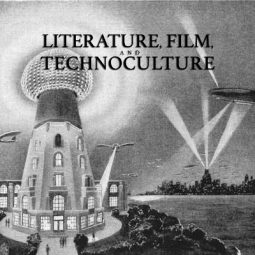INSTRUCTORS:
Looking to purchase an Anytime Audit? Our Lectures are moving! Click HERE to learn all about it.
It is impossible to ignore the fact that our technologies and our cultures are inextricably linked, at least in the industrialized West. Advanced technologies enable the extension of lifespans, the simulation of realities, the mapping of genetic codes, and the creation of art. They facilitate instantaneous communications across the globe, collapsing, as David Harvey has claimed, the traditional distances of space and time. Our cultures have always been connected to our tools, but the relationship has never been more intimate.
This course aims to survey a range of literary and cinematic narratives that explore the growth, acceleration, and consequences of modern technoculture. Works of literature—science fiction, speculative fiction, imaginative literature, and so forth—will be placed alongside films—short and feature, mainstream and fringe—and embedded historically within debates and developments such as bio-engineering, cyborgs, future cities, gender, high-tech war, race, the singularity, and more. By studying texts as discourses rooted in a complex and shifting technocultural landscape, students will discuss some of the ways these narratives shape—and are shaped by—our technological realities.
Course Schedule
Literature, Film, and Technoculture will have two 1-hour lectures plus two 1-hour preceptor sessions per week (4 hours/week total).
Week 1 – Genre, Discourse and Technoculture
- Reading: “The Heat Death of the Universe,” Pamela Zoline (1967)
- Viewing: The Day the Earth Stood Still (1951)
Week 2 – “Origins” and Evolutions
- Reading: The Battle of Dorking: Reminiscences of a Volunteer, George Tomkyns Chesney (1871)
- Viewing: Le Voyage dans la Lune (1902)
Week 3 – Techno-Utopias and Future Cities
- Reading:
- “The Concentration City,” J.G. Ballard (1957)
- “The Gernsback Continuum,” William Gibson (1981)
- Viewing: Metropolis (1927)
Week 4 – Robots, Servitude, and Disposability
- Reading:
- R.U.R. (Rossum’s Universal Robots), Karel Čapek (1920)
- “Super-Toys Last All Summer Long,” Brian Aldiss (1969)
- Viewing: WALL-E (2008)
Week 5 – Gender and the Battle of the Sexes
- Reading:
- “The Conquest of Gola,” Leslie F. Stone (1931)
- “The Screwfly Solution,” James Tiptree, Jr. (1977)
- Viewing: Under the Skin (2013)
Week 6 – Open Discussion
- Viewing: La Jetée (1962)
Week 7 – Race, Resistance, and Aliens
- Reading: Dawn, Octavia E. Butler (1987)
- Viewing: District 9 (2009)
Week 8 – High-Tech War and Deterrence
- Reading:
- “That Only a Mother,” Judith Merril (1948)
- “The Soviet Strategic Threat from Space,” The Citizens Advisory Council on National Space Policy (1983)
- Viewing: Starship Troopers (1997)
Week 9 – Bio-Engineering and Societal Collapse
- Reading: Oryx and Crake, Margaret Atwood (2004)
- Viewing: 12 Monkeys (1995)
Week 10 – Simulation, Hacking, and Cyborgs
- Reading:
- “Burning Chrome,” William Gibson (1982)
- “Pretty Boy Crossover,” Pat Cadigan (1986)
- Viewing: RoboCop (1987)
Week 11 – The Singularity and Beyond
- Reading: Accelerando, Charles Stross (2005)
- Viewing: Her (2013)
Week 12 – Open Discussion
- Rogue Farm (2005)
Required Materials
The Amazon links are provided for convenience only, and we encourage students to purchase the text wherever they wish.
Texts
- The Wesleyan Anthology of Science Fiction, eds. Arthur B. Evans et al.
- Dawn, Octavia E. Butler
- Oryx and Crake, Margaret Atwood
- Accelerando, Charles Stross
Films
- The Day the Earth Stood Still (1951)
- WALL-E (2008)
- Under the Skin (2013)
- Starship Troopers (1997)
- 12 Monkeys (1995)
- RoboCop (1987)
- Her (2013)
- District 9 (2009)
Note: The above film links are to where they can be purchased at Amazon; however, you may also be able to find them on various streaming services such as Netflix, iTunes, etc. Search for available streaming services at Just Watch.
Course History
This course will be offered in the following semesters.
| Semester | Preceptor(s) |
|---|---|
| Spring 2018 | Brenton Dickieson |



